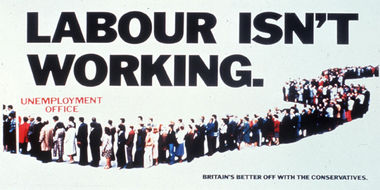Copywriters can't resist playing around with words. But when is wordplay right for a brand? Here's what works - and what doesn't.
O what a punderful world
Us copywriters are paid to be smart with language. It's our job to manipulate words, fusing, refining and cross-fertilising meaning to compel, provoke and persuade. Wordplay might (okay, definitely will) elicit groans at the dinner table, but some of the finest writers in the English language have leaned heavily on the humble pun: Shakespeare, Pope and Joyce to name three of the best. Even Alfred Hitchcock reckoned that the pun was the 'highest form of literature'.
Making people smile
A good play on words communicates two pieces of vital information for the price of one and makes audiences smile while it's at it. Take Tesco, one brand that knows a thing or two about two for the price of one, and their recent van sides. They use a clever piece of copy to communicate the convenience of online shopping and the fact that shoppers needn't compromise on quality or freshness. There's an informality in the message that helps humanise a supermarket giant, but the wordplay isn't laboured, so it doesn't become tiresome too quickly. A
Tesco van is a moving billboard, used as much to market their brand as to
deliver your weekly shop.
| Low hanging fruit - but charmingly effective |
| Flattery will get you everywhere |
From fruit that makes you think to food for thought. The Economist's now legendary ad campaign targeted intellectual decision makers and ambitious professionals. Clever wordplay is used extensively as it's aimed at intelligent, critical thinkers. But no less an authority than Paul Arden (for a long time, Saatchi & Saatchi's creative head) warned all copywriters, "Do not put cleverness in front of the communication". Whilst that's a good general rule, The Economist wanted to reach people who were just that: clever.
If audiences 'got' the adverts, the magazine was right for them. These ads work so well because the wordplay communicates a range of powerful emotional benefits: people who read The Economist are smart, important and witty, just like you. It also promised that the magazine's writing would be witty. It's not wordplay for wordplay's sake.
Making people remember
The best wordplay communicates as much as possible in as few words as possible - and makes it unforgettable to boot. The Saatchi & Saatchi poster for the Conservative party during the 1979 general election was so powerful, many commentators credited the advertisement for the Tory's landslide election win. In 1999 Campaign dubbed it the 'Best Poster of the Century'.
Contained in the phrase 'Labour isn't working' are two distinct, but interconnected meanings that both make the reader think voting Conservative is a good idea: 'the Labour party isn't doing a good job' and 'unemployment is spiralling under Labour'. The fact that both messages are wrapped up in a smart pun - the word 'labour' means 'working' - makes the ad superbly memorable.
When to stop (word)playing around
Wordplay isn't always best. Those terrible puns you see adorning the fronts of hair salons the world over might be harmless. But if you're a big brand, you need to avoid the 'uh' reaction.
What Saatchi & Saatchi got right, Indian got dead wrong. This campaign from the US State, trying to persuade people to people from neighbouring Illinois falls flat - and not just because the pun itself is contrived. This sort of ad, coming from state government, should be formal, trustworthy and professional. That doesn't mean it can't be smart, like the Saatchi ad - but it should be serious. If a state can't take itself seriously, would you really trust it to provide the infrastructure, services and support you need from government? As we've explained elsewhere, it's important to take a long look at yourself before trying to reach out to your audience.
| Death, taxes and dodgy puns |
Seat again?
Here's another dodgy effort. Like Indiana's groan-worthy 'Illinoyed', Seat's wordplay misfires because consumers should have to mispronounce an existing word to get to your newly minted pun. Think back to Tesco's 'Freshly Clicked' - it should be a seamless blending of two different meanings, not a contrived forcing together of sounds in an attempt to get at something new.
| Pun-enjoyable |
Harsh criticism awaits for puns that flop or are misplaced: they are a joke falling flat. But ones that surprise by being delightfully adept are justly celebrated. Give it a go. You can always go back to a straight line if your writer has a bad day and can't come up with a winner.


No comments:
Post a Comment